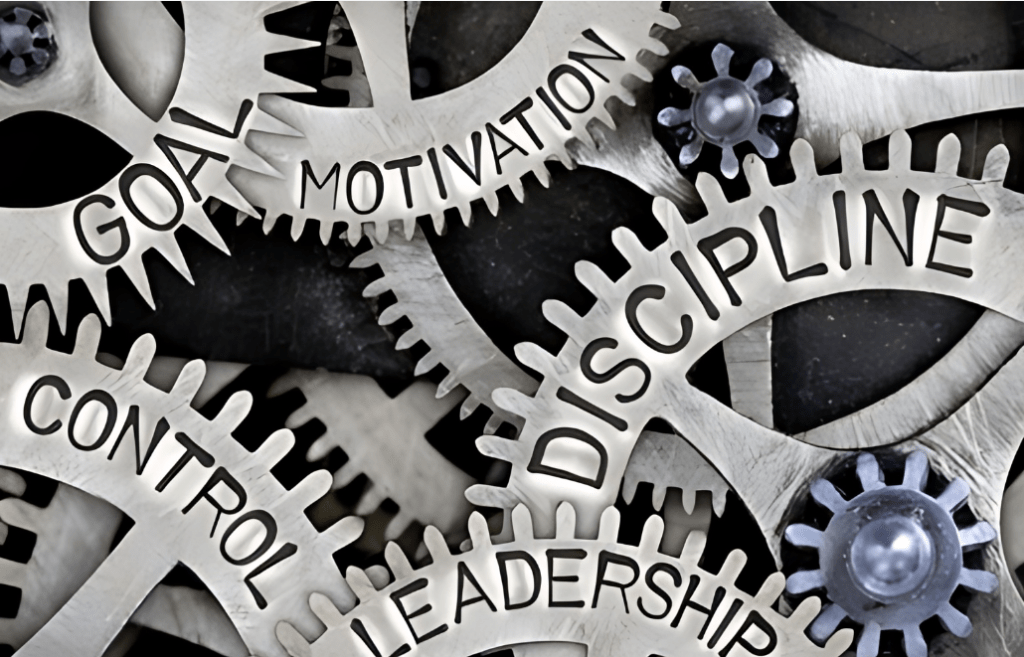Understanding Discipline Beats Motivation—What really works as a real game changer?

Table of Contents
ToggleLet’s dive into the deep realms of discipline beats motivation. These two elements are the driving forces that propel us towards our goals, shaping our actions and decisions. Both are important, but the issue over discipline vs. incentive typically leads to heated arguments.
Discipline is training oneself to obey rules or a code of behavior, while motivation is the reason or reasons one has for acting or behaving in a particular way. Together, they form the foundation for achievement. It’s like running a marathon: discipline keeps you training consistently, and motivation gets you to the starting line.
The Importance of Discipline
Discipline is like a superpower that helps kids and grown-ups do amazing things in life! According to the research shared by the U.S. Department of Education, when students learn how to stay focused, follow rules, and manage their time well, they become much better at school—and just about everything else too (ERIC, 2016). It’s not about being bossy or strict; instead, discipline teaches us self-control, responsibility, and respect for others. Imagine learning to ride a bike: once you master balance and steering, you can confidently accelerate forward.
When families, schools, and communities work together to teach discipline with love and patience, amazing things happen. Kids don’t just follow rules—they start to see why those rules are important. They understand empathy, fairness, and how what they do impacts others. As time goes by, these lessons become habits that stick with us forever.
This Eric report.pdf shows that good discipline leads to success. It doesn’t just mean being strict. Instead, it helps create thoughtful, respectful, and strong people who can do well in any situation. According to that survey of pupils in Muhoroni Sub-County, Kenya, the researcher found discipline is the leading indicator of academic performance. They understood that discipline, more than talent or luck, helped them overcome obstacles and reach their goals. This discipline mantra beats talent, a common thread among high achievers.
In schools, teachers say that classrooms run so much smoother when students understand expectations and stick to them. When children practice positive behavior every day—like listening carefully, raising their hands, and finishing work on time—they create a happy place where everyone gets a fair shot to learn and grow. This kind of positive discipline doesn’t punish mistakes; it guides kids gently toward making smarter choices next time. And guess what? That same skill set helps later in jobs, friendships, and family life, too!
What makes discipline truly special is that it builds inner strength. Instead of relying only on someone yelling “Sit down!” or “Be quiet!”, kids start to hear a little voice inside saying, “I can handle this.” That inner voice grows stronger through routines, clear rules, and kind reminders from adults who care. The study shows that students who feel safe and supported are far more likely to behave well and believe in themselves. So really, discipline isn’t about control—it’s about helping young hearts and minds shine bright with confidence and kindness.
Understanding Motivation
Motivation is like the engine in your car—it powers you up and gets you moving toward whatever you dream of doing! Whether it’s getting better grades, learning a new sport, or chasing a big job goal, motivation is that warm, exciting push inside you that says, “Let’s go!” Just like Wikipedia explains, motivation starts with something catching your attention—maybe a challenge, an idea, or even a tough moment—and then keeps you going strong until you reach your goal. It’s not just a one-time zap; it’s a journey that grows step by step.
Imagine someone who chooses to eat healthier or change jobs because they want to improve their life. Their decision didn’t come out of nowhere; it was driven by a strong motivation inside them. When they find their purpose, they take action, keep coming back, and work harder than ever. The truth is, even if someone has natural talent, they won’t succeed without hard work. But a person with passion, hard work, and commitment every day? They usually go higher than people thought. Hard work truly wins over talent when talent doesn’t put in the effort.
Yes, motivation is vital. It takes dreams and makes them plans, then turns those plans into real progress. What’s the best part? Everyone can use it. Just find what excites you and let that feeling lead you ahead, one step at a time.
Discipline vs. Motivation: The Ultimate Showdown
I still remember the days when I was trying to get into shape. I was driven by the desire to look great for the summer, feel more confident, and be able to run without getting tired. But let’s be real, that motivation only lasted for a moment. It wasn’t until I developed a discipline of regular exercise and healthy eating that I actually started to see results. That’s when it hit me—discipline and motivation are two very different things. Motivation is like a spark that ignites the fire, but discipline is what keeps the fire burning.

Pic credit: iStock
Understanding Discipline and Motivation—Are they exactly in the same tone?
So, what is discipline, exactly? Discipline is like a muscle that needs to be exercised. It’s the ability to control your impulses, to make sacrifices, and to stay focused on your goals. It’s not always easy, but it’s what separates the champions from the wannabes. I like to think of discipline as the bridge between goals and accomplishment. Without discipline, you’re just wandering, hoping that motivation will carry you through. However, if you possess discipline, you can accomplish any goal you desire. For instance, Thomas Edison, the famous inventor, is quoted as saying, “I have not failed. I’ve just found 10,000 ways that won’t work.” That’s discipline in action.
Further explore –the battle of motivation vs. consistency, and how to keep them always right away
The Limits of Motivation
Motivation, on the other hand, is like a rollercoaster ride. There are ups and downs. One day you’re feeling motivated, the next day you’re not. It’s like having a bad hair day, but instead of just having a bad hair day, you’re having a bad motivation day. And, let’s be real, we all have those days. But the problem with relying on motivation is that it’s not sustainable. It’s like trying to run a marathon on a sprinter’s energy. You might get started, but you won’t finish. I recall a time when I was working on a project, and I was so motivated to get it done. But, as the days went by, my motivation started to wane, and I found myself procrastinating. That’s when I realized that I needed to develop a discipline to see the project through.
The Power of Discipline
Discipline is what gets you up at 5 am every morning to work on your goals. Discipline is what makes you say no to that extra slice of pizza. Discipline is what keeps you going even when you don’t feel like it. And, let me tell you, it’s not always easy. But the payoff is worth it. When you develop discipline, you develop a sense of confidence and self-trust. You start to believe in yourself and your abilities. You start to see that you’re capable of achieving anything you set your mind to. For example, J.K. Rowling, the author of the Harry Potter series, was a single mother living on welfare when she started writing her books. She had to develop a discipline to write every day, despite the challenges she faced.
Finding the Balance
So, what’s the balance between discipline and motivation? I think it’s finding a way to make discipline work for you, rather than against you. It’s finding ways to make the process enjoyable, rather than just focusing on the result. It’s finding ways to make discipline a habit, rather than just a chore. When you find that balance, you’ll be unstoppable. You can do anything you want with ease and confidence. So, don’t just rely on motivation—develop discipline. Your future self will thank you. By combining discipline and motivation, you can achieve greatness and make your dreams a reality.
Verdict: Discipline Beats Motivation—What Really Works?
The Truth Hurts (Just a Little)
Let me share something I really wish I had figured out a long time ago: motivation is exciting, but discipline sticks around. Motivation shows up like a wild party guest—full of energy, loud, and super hyped. You feel fired up. You can climb a mountain or launch a rocket. But just as quickly, it bounces. Boom—gone, sometimes by the next day. Discipline is different. Quiet. Steady. This is more like your friend who consistently wears old gym clothes and shows up regardless of the situation. Despite the rain, snow, tiredness, and boredom, he remains present. I used to wait around for motivation to hit before starting anything. Bad move. That’s like waiting for sunshine in a rainstorm. These days, I don’t wait. I do the thing anyway—even if I’m sleepy or not in the mood. Discipline is what kept me going when the hype faded.
Why Discipline Actually Wins Long-Term
Here’s the deal—motivation lives in feelings. Feelings change. One day you’re crushing it, next day Netflix seems more fun than lifting weights. Discipline doesn’t care how you feel. It runs on commitment. It’s like brushing your teeth. Nobody loves it, but we all know skipping it feels gross. Building discipline helped me finish projects, keep promises to myself, and actually see results. I stopped needing pep talks every hour. Instead, I made tiny habits that stuck. Showered at the same time. Wrote two lines daily. I walked around the block. Tiny stuff. Big power. Motivation gave me sparks. Discipline gave me fire.
My Final Word (And Yes, I Have One)
Look, motivation’s great. I still love it. It’s like caffeine—short boost, nice rush. But I don’t build my mornings around caffeine, and I shouldn’t build my life around bursts of emotion either. Discipline became my plan B, C, D, and Z. It carried me through sick days, sad days, lazy days. It’s the reason I showed up again and again until things got easier. If you want lasting change, don’t chase butterflies. Build fences. Grow roots. Motivation might open the door, but discipline walks you through it—and locks it behind you so you never go back.
A. Recap of how discipline beats motivation
Motivation is often fleeting and can be easily swayed by external factors or inner doubts. It relies on external stimuli to keep us going; when those stimuli fade, our motivation tends to dwindle. On the other hand, discipline is an internal force that drives us forward even when the initial excitement fades away. It is the ability to stick to a plan, to show up consistently, and to put in the necessary effort day after day.
B. Final thoughts on maintaining a balance between discipline and motivation
Maintaining a balance between discipline and motivation is integral for personal and professional growth. Discipline helps maintain consistency, enables goal achievement, and upholds workplace decorum. On the other hand, motivation can help you stay focused amidst challenges, enhancing your ability to excel in the workplace or reach goals.
According to the Employee Success Insight sight, finding a balance between the two can stop burnout and support mental health simultaneously.
Managers can keep this balance by setting clear goals and taking short breaks to stay focused. Nursing students can stay motivated by changing their study times and methods to avoid burnout. Maintaining consistency and discipline is crucial in this process.
Importantly, discipline and motivation are not mutually exclusive. They complement each other. Discipline provides the structure needed to channel motivation effectively, while motivation provides the incentive to uphold discipline.
And, finally, you may find discipline beats motivation!
Frequently Asked Questions
Why is discipline better than motivation for long-term success?
Motivation can come and go, but discipline is a choice you can always make.
Motivation is about feelings, so it can change. Discipline means sticking to your goals and taking action consistently. Discipline helps create good habits. Habits help us stay on track when the excitement wears off.
What is the simplest difference between the two?
Motivation is the spark, and discipline is the fuel.
Motivation helps you begin a goal. Discipline is the daily habit that helps you keep moving forward. To succeed over time, you need both.
Can I have discipline without any motivation?
Yes, you can have discipline even when you don’t feel motivated.
Discipline is about sticking to your promises, not just following your emotions. It’s okay to stick to your routine, even when you feel low on energy. This action strengthens the habit.
How can I actually build my discipline?
Begin with small, easy habits.
Choose one small promise. Do it daily, just like making your bed. This little victory strengthens your self-control. Making things easier helps you stay consistent.
Does discipline mean my life will be boring?
Staying disciplined helps you make steady progress, and that feels good.
Discipline may not look as exciting as motivation. Your steady progress really boosts your confidence. Seeing steady progress brings a feeling of peace and control.
What are some ways to develop discipline when I lack motivation?
Build a solid daily routine and cut down on decisions.
Make a plan for your day so you know what to do. Lay out your gym clothes the night before. Choose the best option easily.
Does discipline help me handle setbacks?
Discipline helps you get through hard times.
Discipline keeps you on track with your plans, even when things don’t go as expected. It shows you how to keep going and recover fast. Your commitment matters more than how you feel right now.
Happy reading!
Pic credit: iStockphoto & Shutterstock


